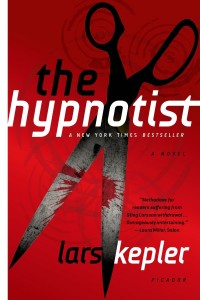This is my first foray into the works of Swedish crime-novelist Kepler, and it was –umm — mesmerizing. The horrible slaughter of nearly an entire family leaves Detective Joona Linna determined to solve the mystery, and as readers learn right away, the highly-respected detective is always right and is famous for his “told you so”s. The problem is that no one has any idea why someone butchered the father across town, then went to the home and murdered the wife, the little girl and left the teenaged boy covered in knife wounds and blood, and nearly dead.
An eldest daughter was away from home at the time, and Linna needs to find her and get her protection in a hurry. To do that, he must question the boy on where she is and who committed the crime. The boy is, however, in critical condition and time is of the essence, so Linna turns to reluctant psychologist and former hypnotist Dr. Bark, who has serious issues of his own, including an angry and mistrustful wife and a fragile son with a debilitating blood disease. Convinced to violate his own oath never to hypnotize anyone ever again, Dr. Bark gets the boy to speak, and the shocking revelations throw both Linna and Dr. Bark into a maelstrom of dire consequences. The action ratchets up and more characters are rapidly introduced to fill out the plot, as well as various sub-plots centered around Dr. Bark’s past, his wife, and his son.
Kepler uses an increasingly common writing technique of chapters that shift back and forth between characters and points of view, while delving into the increasingly popular subject matter of violent mental disorders. Also featured is dysfunction among impoverished youth, which is hardly a Swedish problem. As the book evolves, the techniques—and ethics—of hypnosis as a treatment tool come to the fore and are probably the most interesting aspects of The Hypnotist, which is otherwise just another rather bloody Nordic crime thriller.

